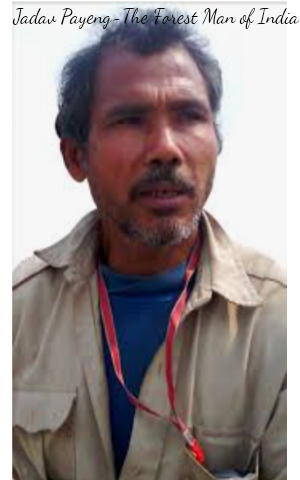Jadav Payeng-The Forest Man Of India
Jadav Payeng-The Forest Man Of India


Jadav Payeng was honored with the title 'Forest Man of India' on 22nd April 2012 by the Jawaharlal Nehru University.
Jadav Payeng, who is also popularly known as Molai Payeng, earned his name as 'The Forest Man of India' by spending 30 years of his life planting around 40 million trees to create a real man-made forest by changing a barren sandbar of the Brahmaputra, covering an area of 550 hectares of land which is known as 'Molai forest ' named after him. It is located near Kokilamukh of Jorhat, Assam, India.
This is an interesting true story from the Indian state of Assam. Many ancient scriptures, folklore and stories depict how the lifestyle of people in the state of Assam is tangled with the disposition of the mighty river, Brahmaputra which flow through Assam. Brahmaputra is also called ‘Sorrow of Assam’, as the river causes severe damage to villages and townships due to flooding year after year. Every monsoon Brahmaputra submerges islands and gives birth to new ones. Floods destroys houses, displaces residents making them homeless. It takes away their agricultural lands and erodes fertile lands and creates miles and miles of barren sandbars. It sounds catastrophic but it is a regular occurrence there!
So, this story is of Jadav Moloi Payeng, who was born to a poor buffalo farmer of Mishing tribe in Assam. In 1965 due to flooding of river Brahmaputra his native land, the river island Aruna Sopari was submerged. His family had no option but to take refuge in Majuli. Majuli, the world's biggest river island is surrounded by river Brahmaputra. Majuli also had to bear the fury of the river and it is said that over the century the strip connecting Majuli to the mainland disappeared, the green vegetation of Majuli was washed away slowly but steadily and repeated flooding had left behind sandbars, a barren landscape without trees and grass, filled only with sand.
Jadav Payeng after finishing his X standard in Jorhat Assam returned to his native.
The Mulai Reserve is a forest on the Majuli Island in the Brahmaputra River near Kokilamukh in the Jorhat district in Assam, India having a total area of about 1,000 hectares and is under continuous threat due to the extensive soil erosion on its banks.
Majuli has shrunk over the past 70 years by more than half. There are concerns that it could be submerged within the next 20 years. To fight this, in 1980, the Assam Forestry Division of Golaghat district began a plan to reforest 200 hectares of the forest in one of the sandbars of the Brahmaputra river.
However, the program was sadly abandoned in 1983. After that, the forest was single-handedly attended by Jadav Payeng during the course of over 30 years. He began planting bamboo, as suggested by village elders. Bamboo trees go very fast and thus was a good idea. However he also planted other species of trees. Jadav Payeng transported red ants from his village to Molai forest as he believed that red ants altered the properties of the soil.
Jadav Payeng still lives in a small hut in the middle of the forest that he built. He makes his living by selling cow and buffalo milk. He wants to spread his Molai Forest to Bongoan of Majuli. The Molai forest created by Jadav Payeng is larger than Central Park in New York City.
Over the course of many years, he has planted and grew trees so many that it has become a Forest. In 2015, he was honored with Padma Shri, the fourth highest civilian award in India. He was also honored by the Indian Institute of Forest Management. Jadav Payeng was later awarded the ‘Ecological Restoration Award’ by Balipara Foundation in 2013. In recognition to his outstanding services to environmental conservation, he was conferred with the Karmayogi Award for 2020 in New Delhi.
He was born in the indigenous Mising tribe of Assam.
In the year 1979, when Jadav Payeng was merely sixteen years old, had located a large number of snakes which had died due to scorching heat after floods washed them onto the sandbar, which had no trees then!
This incident prompted him to plant trees! Firstly he planted around 20 bamboo seedlings on the sandbar.
He started working on the forest in 1979 when the social forestry division of Golaghat district launched a scheme of tree plantation on 200 hectares at Aruna Chapori situated at a distance of 5 km from Kokilamukh in Jorhat district.
Molai worked as a labourer in that project which was completed after five years. He chose to stay back after the completion of the project even after other workers had left.
He not only looked after the plants, but continued to plant more trees on his own, in an effort to transform the area into a forest!
The forest, which came to be known as Molai forest after him, now houses Bengal tigers, Indian rhinoceros, and over 100 deer and rabbits. Molai forest is also home to monkeys and several varieties of birds, including a large number of vultures.
There are several thousand trees, including valcol, arjun (Terminalia arjuna), ejar (Lagerstroemia speciosa), goldmohur (Delonix regia), koroi (Albizia procera), moj (Archidendron bigeminum) and himolu (Bombax ceiba). Bamboo covers an area of over 300 hectares. Jadav had consulted the village elders and was advised to plant bamboo trees.
A herd of around 100 elephants regularly visits the forest every year and generally stays for around six months. They have given birth to 10 calves in the forest in recent years.
His efforts became known to the authorities in the year 2008, when forest department officials went to the area in search of 115 elephants that had retreated into the forest after damaging property in the village of Aruna Chapori, which is about 1.5 km from the forest. The officials were surprised to see such a large and dense forest! Since then the department has regularly visited the site.
In 2013, poachers tried to kill the rhinos staying in the forest but failed in their attempt due to Molai who alerted department officials. Officials promptly seized various articles used by the poachers to trap the animals.
Molai is ready to manage the forest in a better way and to go to other places of the state to start a similar venture. Now his aim is to spread his forest to another sand bar inside of Brahmaputra.
Jadav Payeng belongs to the Mising tribe in Assam, India. He lives in a small hut in the forest. Binita, his wife, and his 3 children (two sons and a daughter) accompany him. He has cattle and buffalo on his farm and sells the milk for his livelihood, which is his only source of income. In an interview from 2012, he revealed that he has lost around 100 of his cows and buffaloes to the tigers in the forest, but blames the people who carry out large scale encroachment and destruction of forests as the root cause of the plight of wild animals.
Jadav Payeng is the protagonist of an award-winning 2013 documentary made by Canadian filmmaker William Douglas McMaster, appropriately titled, “Forest Man.”
In 2012, a locally made documentary film produced by Jitu Kalita, The Molai Forest, was screened at the Jawaharlal Nehru University.
Jitu Kalita, who lives near Jadav Payeng's house, has also been featured and given recognition on his work reporting the life and accomplishment of Jadav Payeng through his documentary film. The Molai Forest was also featured in the 2013 documentary film Foresting life, directed by the Indian documentary filmmaker Aarti Shrivastava.
His contribution to the environment was acknowledged by honoring him with the 'Padmashree' award. His story gives us a message that a single person can bring about a big change and it is the will which is required to do so.
Once when he learned that some people had come to his area to fell down trees, he confronted them with the warning, “Cut me up before you cut them down. I won’t allow you to cut down any trees!”
The intruders eventually relented and left, Jadav Payeng told a cheering audience.
Jadav Payeng was honored with the 128th Commonwealth Points of Light Award for exceptional voluntary and tangible contribution to the local community at a felicitation ceremony in Guwahati in the year 2020.
Since the early 1980s, he has almost single-handedly planted over 550 hectares of forest on Molai, an area that would roughly equal 15 football fields!
He has recommended linking planting trees to children’s education to bolster the effort and make them environmentally conscious. He is writing a book on how to plant trees, whose sole objective is to educate the children on the importance of trees in our lives.
Jadav Payeng has proved that poverty and illiteracy are no barriers for a man determined to change the destiny of mankind and do something for the betterment of the world. Though he do not possess any academic degree, he has still forced the scientists to follow his methodology for grassroot level conservation of forests.
It was only because of his dedication and perseverance that bore result as over the years there were several thousand trees growing on the sandbar! The flourishing forest brought in a variety of birds, rabbits, deer etc. The dense forest became home to monkeys, tigers, rhinoceros and elephants. The barren sandbar after years of plantation became converted into a deep forest complete with wild life. The forest is called ‘Molai forest’. It is named after the man who created the forest, Padma Shri Jadav Molai Payeng. The name of the forest given by the Government of Assam is ‘Mulai Kathoni’ ;‘Kathoni’ means ‘forest’.
Jadav Payeng's life began to change in the fall of 2007, when a photojournalist stumbled upon Payeng and discovered him seeding his forest and wrote an article about him. He soon gained the attention of the Indian government and then the entire country — winning multiple awards for his incredible achievements and giving TED talks. He has viable ideas to save Majuli Island from erosion by planting coconut trees that grow straight and when planted together in close proximity protect the soil. In turn, this would not only help India’s economy but help fight climate change!
His worst fear for his forest is deforestation for financial gain, which makes the flora and fauna vulnerable to human greed. He believes in mutual existence in which all living beings would live peacefully and harmoniously without causing any harm to one another.
In 2018 Department of Botany VPM’s B. N. Bandodkar College of Science conducted an International conference ‘Green Earth: A panoramic view’. Padma Shri Jadav Molai Payeng was the chief guest. He recounted his experience in the making of Molai forest. A simple man with a simple logic – ‘Love nature, nature will reciprocate’. The standing ovation he received clearly showed that he is an inspiration for everyone.
Jadav Payeng says that "When I was a little boy, a man looked at my palm to read it,” . “He said that my life will take the course of Nature.” There may or may not be truth in palm-reading, but the prophecy came true!!
The forest that he built over these many years is gradually growing. Jadav Payeng says that 'Expanding his forest is not as difficult as it used to be now, since Nature does a bulk of the work. But there’s one threat that he deals with every day: poachers'. He knows that these intruders have an eye on his forest and its inhabitants, which is why every time he has to travel somewhere, he requests the local Forest Department authorities to keep an eye on the poachers.
A truly inspiring personality, Jadav Payeng has inspired many to save trees and plant new trees. His message is simple and clear : Save Trees Save Lives Save Our Planet.
We can learn from the story of Jadav Molai Peyang that positive attitude towards environment, hard work with patience and a single person, with determination can do wonders. If our intention is good, then the whole existence comes to our aid!
































































